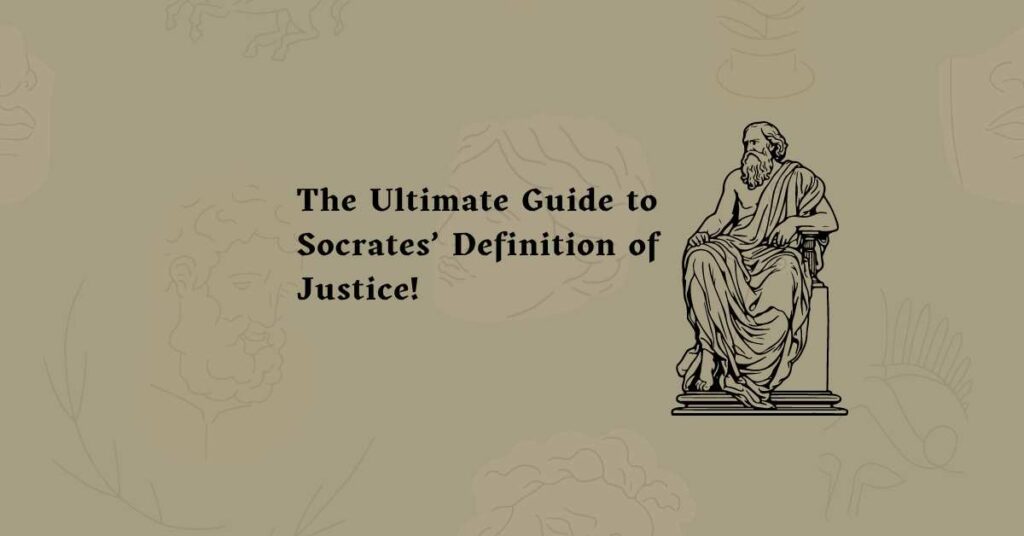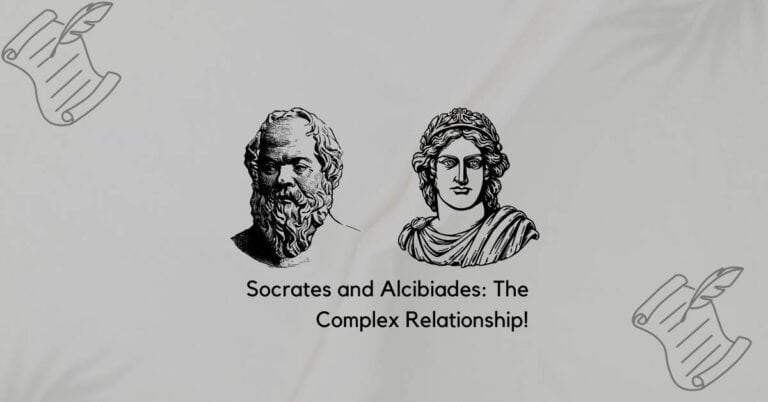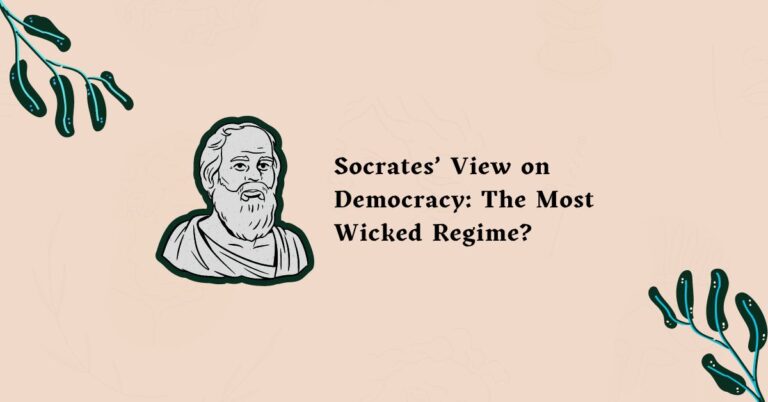Socrates’ Definition of Justice: Does It Still Matter Today?
Socrates’ definition of justice emphasizes the inner harmony and balance of the soul. He believes that being fair isn’t just about obeying rules from outside, like laws or what people say you should do. It’s more about how different parts of your inside self work together in the right way.
He thinks things are fair when our thinking part controls our wants and feelings. And everyone does their own job without bothering others. This internal virtue of justice leads to a well-ordered and virtuous life.
You can learn more about what Socrates thinks about fairness in Plato’s Republic. Look especially at Book 1 and Book 2 for more information.
What is Socrates’ definition of justice?
For Socrates, justice is like finding the right balance in life, which was a big deal in ancient Greece. It’s also about knowing yourself, understanding what you’re good at and what you’re not, and being willing to learn from others.
He also thought it was important to listen to people in charge and not cause trouble for anyone. So, justice is kind of like being fair, knowing yourself, and being a good citizen all rolled into one.
Socrates’ Definition of Justice in Plato’s Republic
-
Socrates’ definition of justice book 1
In the first part of Plato’s “Republic,” Socrates talks with different people about what they think justice is. He chats with folks like Cephalus, Polemarchus, and Thrasymachus, who each have their own ideas.
But Socrates questions what they say, trying to figure out what justice really means. Even though he talks a lot about justice in Book 1, he doesn’t give his own final definition there.
These are some key points of discussion:
- Cephalus’ Definition:
The conversation starts with Cephalus saying that being fair is about doing what the law says and being honest with others. But Socrates wonders if that’s all there is to justice. - Polemarchus’ Definition:
Polemarchus says being fair means you help your friends and hurt your enemies. But Socrates asks if it’s really fair to hurt people who aren’t really your enemies or to help friends who aren’t always fair themselves. - Thrasymachus’ Challenge:
Thrasymachus jumps in and says that being fair just means the powerful people get what they want. He thinks leaders make rules to help themselves. Socrates talks with him for a while, asking questions to understand his idea better. Then Socrates shows why Thrasymachus’ idea isn’t right. - Socrates’ Method:
During these talks, Socrates uses a special way of talking called the dialectical method. He asks lots of questions and tries to understand things better by talking them out. He also pushes the other people in the conversation to think more about what they’re saying and to make their ideas clearer. Socrates wants to figure out what being fair really means.
These talks get things going for the rest of the “Republic.” In the later parts, Socrates keeps talking about what fairness is, what a perfect society would be like, and what makes people who they are inside.
-
Socrates’ definition of justice book 2
In the second part of Plato’s “Republic,” Socrates starts to talk about what he thinks justice is all about. He says being fair means everyone does their job in society the right way. When everyone does their part, it makes the whole community happy and things run smoothly.
He shows this idea by talking about a perfect city called the “just city” (Kallipolis). In this city, everyone has a job that they’re good at and like to do. When everyone does their job well, the city works smoothly and fairly. But as the conversation goes on, Socrates and his friends keep talking about what fairness really means. And how it affects people and society.
- How a Person Acts:
Socrates says fairness isn’t just about following rules; it’s also about feeling balanced inside. He talks about the soul having three parts: the thinking part, the brave part, and the part that wants stuff. Fairness happens when the thinking part is in charge and each part does its job right. This balance makes a person good and happy. - What It Means for a Whole Society:
Socrates thinks fairness isn’t just for individuals; it’s for the whole city too. He talks about a perfect city called the “just city” (Kallipolis). In this city, everyone does the job they’re best at. The smart people make the rules, the brave ones protect the city, and the workers make things. When everyone does their job, the city stays safe and happy. - Importance of Learning and Being Good: Socrates says education is really important for making good people who are fair. In the perfect city, kids learn about being wise, brave, not too extreme, and fair from when they’re young. By growing up with good education and values, people can help make society better and treat others fairly.
- Questioning and Learning More:
Even though Socrates talks about the perfect city, his ideas are still up for debate and exploring more. His friends like Glaucon and Adeimantus ask questions and talk about what they think. This helps everyone understand fairness and how it affects people and society better.
Overall, Book 2 of the “Republic” shows how being fair is really important for everyone to be happy. It also shows why it’s important for the society to work well.
What is justice for Socrates?
Socrates’ definition of justice, as depicted in Plato’s “Republic,” is multifaceted and evolves throughout the dialogue. Some key aspects of Socrates’ perspective on justice include:
-
Socrates’ view on justice
- Inner Harmony:
In Book 4, Socrates talks about how being fair isn’t just about following rules but feeling balanced inside yourself. He explains that our soul has three parts: thinking, bravery, and wanting things. Justice happens when the thinking part is in control, and each part does its job right. - Social Harmony:
In the ideal city, depicted in Books 2 to 5, Socrates says fairness isn’t just for individuals; it’s for the whole city. He describes a perfect city where everyone does the job they’re best at, making the city happy and working well together. - Virtue and Education:
Socrates connects fairness with being a good person and thinks learning is crucial. In the perfect city, kids are taught about being wise, brave, not too extreme, and fair from a young age. Growing up with these values helps people make society better and treat others fairly. - Ideal Ruler:
Socrates suggests that the best ruler, or philosopher-king, should be wise and genuinely care about the city’s well-being. These rulers make fair decisions for everyone. They focus on the common good rather than their own gain. - Questioning What’s Common:
Socrates challenges what people commonly think about fairness throughout the talks. He questions ideas from others, like Cephalus, Polemarchus, and Thrasymachus, to find a deeper meaning of fairness.
In a nutshell, Socrates’ definition of justice in the “Republic” is all about feeling balanced inside, getting along in society, and learning to be good. having wise rulers, and thinking deeper about what fairness really means.
His discussions help us understand better how being fair affects how we act. Besides, how societies work, and what it means to be a good person.
What is the definition of justice in philosophy?
In philosophy, justice means treating everyone fairly and making things right in society. It’s about making sure everyone gets what they deserve and needs, without playing favorites. Different philosophers have different ideas about what fairness is and how to achieve it.
Some big ideas about fairness include:
- Distributive Justice: This is about dividing things like money and opportunities fairly so everyone has a chance to do well.
- Retributive Justice: If someone does something wrong, fairness means giving them a punishment that fits the crime.
- Procedural Justice: Fairness also means having rules and ways of doing things that treat everyone equally and give everyone a fair chance.
- Restorative Justice: If someone gets hurt or wronged, fairness means trying to make things right and fixing what went wrong.
- Global Justice: Lastly, fairness isn’t just about people in our own community; it’s also about being fair to people everywhere in the world.
All these ideas help us think about how to make our world a fairer and better place for everyone.
How many definitions of justice are in Plato’s Republic?
In Plato’s “Republic,” there are lot of talks about fairness. Different characters like Cephalus, Polemarchus, and Thrasymachus give their ideas about what fairness means. They chat about it in Books 1, 2, and 4, and it’s pretty interesting! Each person has their own take on fairness, which makes the discussion really deep and cool.
What is justice according to Aristotle?
Aristotle, another smart guy, talks about fairness too. He says it’s about making sure everyone gets what they deserve, neither too much nor too little. There are two kinds of fairness: one is about sharing stuff fairly, and the other is about fixing things when someone’s been treated unfairly.
What is Polemarchus’s definition of justice?
Polemarchus, one of the characters in Plato’s book, thinks fairness means helping your friends and hurting your enemies. But Socrates, the main guy in the story, questions if that’s really what being fair is all about.
Summary:
Socrates’ definition of justice in Plato’s “Republic” is all about being good and making sure everyone’s treated right. He talks with different people about what fairness is and why it matters, showing us how important it is to be fair to others and ourselves.
Socrates was a philosopher who, unlike others, didn’t write anything. Most of what we know about him comes from his students like Plato and Xenophon. He’s more like a figure, similar to Buddha. He has interesting viewpoints on different topics, such as his Philosophy About Life, and his thoughts on marriage and love. Moreover, Socrates’ way of looking at religion is quite interesting as well.



